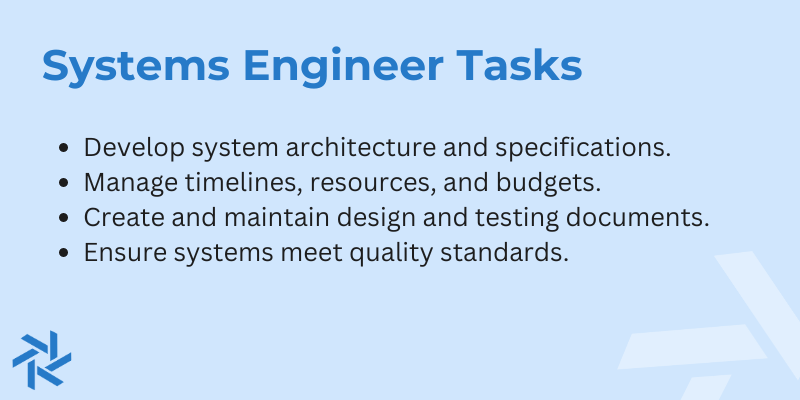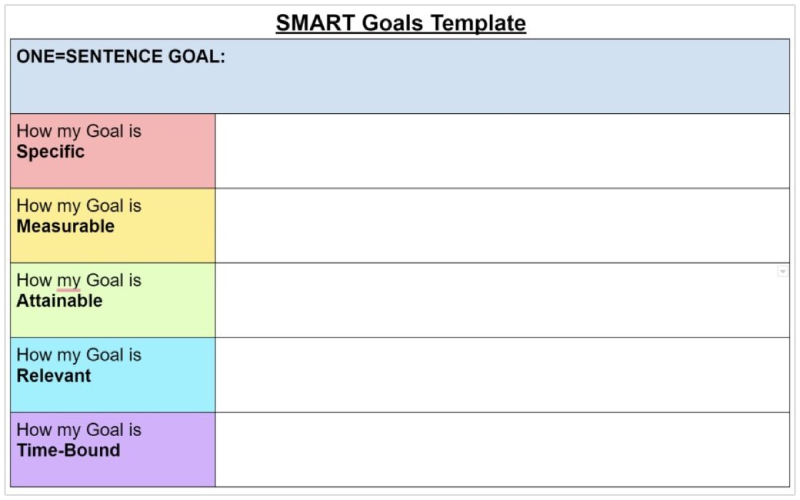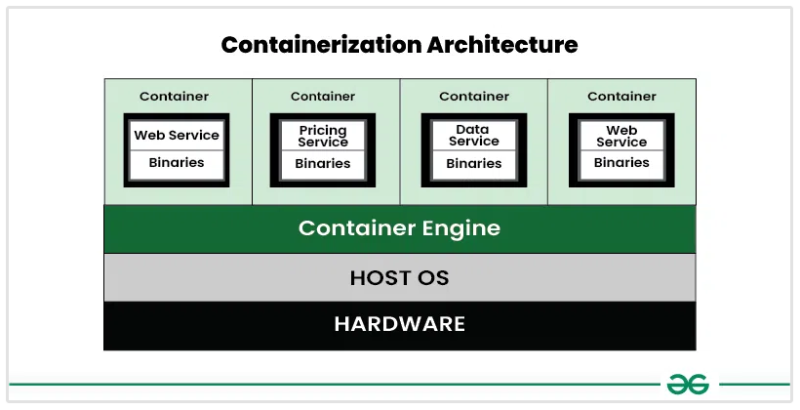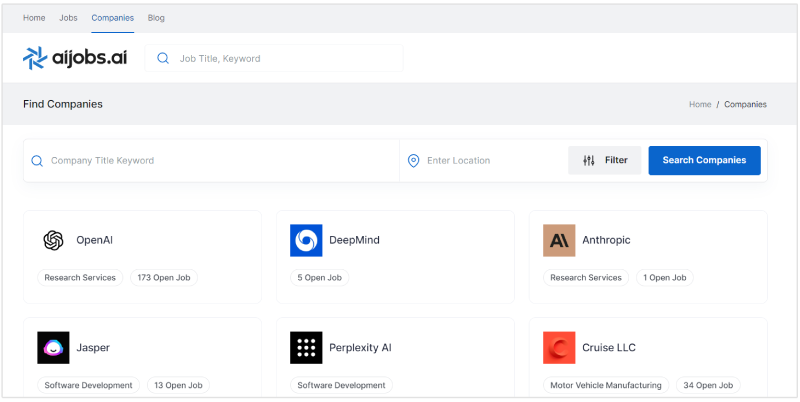Top Systems Engineer Interview Questions

Getting invited for an interview is the first step to securing a job as a systems engineer. However, if you want to get that dream job, then you need to ace the interview and leave a good impression with the hiring manager or the person who conducted the interview.
One of the ways to prepare is by anticipating some of the systems engineer interview questions that you'll likely get asked.
In this post, we will share some of the most commonly asked systems engineer interview questions with matching answers so that you can be well-prepared and ready for your interview.
What is a Systems Engineer?
Systems engineers design and build complex computer systems, from intricate software applications to large-scale networks. They ensure that all components of a system work together effectively to meet both technical specifications and the business goals.

As you'd imagine, this role demands a blend of technical knowledge, problem-solvin9g skills, and an ability to oversee an entire project from conception to completion.
General Systems Engineer Interview Questions
Beyond asking the usual technical questions, hiring managers will often want to explore your approach to work and if you're a good fit within the team culture.
So let's start off with some general systems engineer interview questions. These general questions can shed light on your thought process, communication style, and overall work ethic.
1. Why are you the ideal candidate for this position?
This question offers you an opportunity to distinguish yourself from other candidates, allowing you to communicate your unique skills and experiences that align with the role.
2. What is one accomplishment from your current position that you're most proud of?
This question is a golden opportunity for you to highlight your problem-solving skills, innovation, and the tangible value you've brought to your current or previous roles.
Here are some examples of accomplishments you can highlight as a system engineer:
- Successfully designed and implemented a new system that improved efficiency by 10%. (quantify your impact)
- Troubleshooted and resolved a critical system outage, minimizing downtime and ensuring business continuity. (showcases problem-solving under pressure)
- Migrated a complex system to the cloud, resulting in increased scalability and cost savings. (demonstrates understanding of cloud technologies)
- Led a team in automating repetitive tasks, freeing up resources for more strategic projects. (highlights leadership and teamwork skills)
3. What are your 5 year goals?
This question provides interviewers and hiring managers with insight into your long-term vision and commitment, not only to your career but also to the potential growth within their organization.
Having a 5-year goal is important because it demonstrates foresight, proactive planning, and a readiness to invest in oneself.
If you haven't written down a concrete 5-year career goal, check this useful resource from HelpfulProfessor which also includes a useful template to help you set these goals.

4. What has been the biggest challenge in your career as a systems engineer?
You might get asked this question if the recruiter or interviewer wants to gain insight into your problem-solving abilities and adaptability in the face of challenges.
By discussing the biggest challenge you've faced, you offer a glimpse into your mindset, giving you the ability to showcase your critical thinking, decision-making skills, and readiness to tackle complex problems.
Use this question as an opportunity to demonstrate your value as a proactive and resourceful team member who can contribute significantly to overcoming challenges within their organization.
5. How do you handle conflict in the workplace? Do you have an example of how you resolved workplace conflict?
This question is guaranteed to be asked in any system engineer interview. It highlights a candidate's interpersonal skills, emotional intelligence, and ability to maintain a harmonious work environment—even under stress.
Conflict resolution is an essential competency in any role, this question seeks to understand your methods for addressing conflicts within your team.

Technical Systems Engineer Interview Questions
Now that we've explored some general interview questions, let's delve into the more technical questions.
These systems engineer interview questions are designed to assess your technical aptitude and ability to perform the core tasks of a system engineer.
By understanding these questions and preparing well-structured answers, you can demonstrate your problem-solving skills, technical knowledge, and ability to thrive in a fast-paced technical environment.
6. Explain the pros and cons of different network architectures. When would you choose one over the other?
This question assesses your knowledge of fundamental network structures and their functionalities. A good answer demonstrates your ability to compare and contrast different architectures, highlighting their strengths and weaknesses.
7. Describe your experience with different virtualization technologies
Understanding and experience with different virtualization technologies enable systems engineers to design and implement flexible, efficient, and scalable IT solutions that meet the evolving needs of businesses.
Some common examples of virtualization techniques include:
- Full Virtualization: Creates a complete virtual machine environment, emulating hardware and allowing users to run various operating systems on a single physical machine. (e.g., VMware Workstation)
- Paravirtualization: Similar to full virtualization, but uses guest operating system modifications for improved performance. (e.g., KVM)
- Containerization: Creates isolated environments at the operating system level, sharing the kernel with other containers. Offers lighter-weight and faster deployment compared to full VMs. (e.g., Docker)

8. A critical application is experiencing slow performance. How would you approach troubleshooting this issue?
This is a classic troubleshooting question that assesses several key skills for system engineers.
Even though you might not have experienced such a problem in your career as a systems engineer, it's still a good idea to brush up on some best practices to fix the performance problem.
9. You suspect a network security breach. Explain the steps you would take to investigate and resolve this issue.
Network security breaches can have devastating consequences for businesses.
They can lead to:
- Data Loss: Sensitive customer information, financial data, or intellectual property can be compromised and exposed.
- Financial Loss: Businesses can incur significant costs to contain the breach, recover data, and repair damage to their reputation.
- Regulatory Fines: Depending on the nature of the breach and the data exposed, companies can face hefty fines from regulatory bodies.
- Reputational Damage: A security breach can erode customer trust and damage a company's brand image for years to come.
Systems engineers play a big role in safeguarding an organization's digital assets, underscoring the importance of a prompt, organized, and effective response to any suspected breach.
10. A new system deployment encounters unexpected errors. How would you go about debugging and fixing these errors?
Despite rigorous testing and quality assurance processes, the complexity of today’s technology environments means that unforeseen challenges can arise when a system goes live.
In most cases, every systems engineer has had to deal with bugs or errors at some stage in their career. And the new role you're interviewing for will likely require that you know how to debug any errors that may arise.
11. Describe the benefits and drawbacks of using cloud computing for system deployment.
Cloud computing is rapidly transforming system deployment practices. This question assesses your understanding of the key advantages and potential limitations of deploying systems in the cloud environment.
A well-rounded answer demonstrates your ability to weigh the pros and cons of different deployment models. This showcases your ability to make informed decisions based on specific project requirements.
12. What scripting languages are you familiar with? How would you automate a repetitive system administration task?
Understanding scripting languages demonstrates your ability to automate tasks and streamline system administration processes.
Here are some of the most common scripting languages used by system engineers:
- Python
- Bash Scripting
- PowerShell
- JavaScript (Node.js)
You should remember that each company will likely prefer one language above the others so having some experience in each will definitely count in your favour.
Skills Required to be a Systems Engineer
To excel as a Systems Engineer, a blend of technical acumen, analytical prowess, and soft skills are essential. This role demands a holistic understanding of both hardware and software systems, alongside the ability to work effectively within multifaceted project teams.
Here’s a concise overview of the critical skills required:
Technical Expertise
- Proficiency in Programming and Scripting Languages: Knowledge of languages like Python, Bash, and PowerShell is crucial for automation and streamlining tasks.
- Understanding of Operating Systems: Deep familiarity with Windows, Linux, and UNIX operating systems enables efficient system management and troubleshooting.
- Networking Fundamentals: A solid grasp of networking principles, including TCP/IP, DNS, and firewall configurations, is essential for ensuring system connectivity and security.
Analytical Skills
- Problem-Solving: The ability to quickly identify and resolve complex technical issues is fundamental, requiring strong analytical and troubleshooting skills.
- System Design and Integration: Competence in designing and integrating complex systems to meet specific requirements, while ensuring compatibility and performance.
Project Management
- Planning and Organization: Effective project management skills, including the ability to plan, execute, and oversee projects from conception to completion.
- Agile Methodologies: Familiarity with Agile principles can enhance collaboration and efficiency in project cycles.
Communication and Collaboration
- Effective Communication: Clear and concise communication skills are vital for translating complex technical details into understandable terms for non-technical stakeholders.
- Teamwork: Systems engineers often work in cross-functional teams, making the ability to collaborate and work well with others a necessity.
Adaptability and Continuous Learning
Technology evolves rapidly; thus, a commitment to ongoing learning and adaptability is crucial to stay ahead of emerging trends and tools.
Security Awareness
- Understanding of Cybersecurity Principles: With increasing cyber threats, knowledge of security protocols and best practices is essential to protect data and systems.
These skills form the foundation of a successful career in systems engineering, enabling professionals to develop, manage, and optimize systems that meet organizational goals. A proficient Systems Engineer not only addresses today's challenges but also anticipates future technological needs, ensuring solutions are scalable, secure, and efficient.
Looking for a Job as a Systems Engineer?
Are you looking for a job as a systems engineer? Check out AI Jobs to find the latest jobs in Artificial Intelligence, Machine Learning, and Systems Engineering from some of the leading tech companies around the globe.









